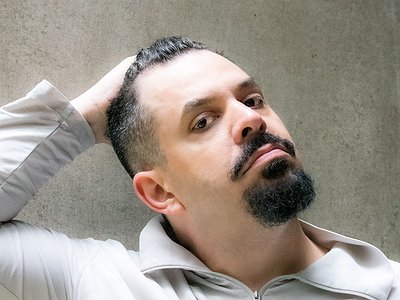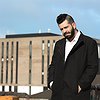Part 2
There are many descriptions of the ideal state of mind for being creative. What is it like for you? What supports this ideal state of mind and what are distractions? Are there strategies to enter into this state more easily?
I don’t know. Some days are not great. But most are. Also, some days I like stuff that I’ve done and some I don’t. So even if I spent the day trying different ideas and none of them work on that particular day, I still save them for another time. Sometimes you listen back to something with a different perspective and it clicks.
One strategy is to put an obstacle or something new to take me out of the comfort zone. I try to do something in a new software or environment. A new scale, a new instrument or maybe even I’d try something overly technical like synching a note one instrument to a different delayed note in a different one, to hear ghost notes appear unpredictably. During these last sessions I tried to build a machine with different softsynths playing pretty much the same timbers, but with different pitch ratios on the wheel. And each note would be in a different synth. So when I played a chord in legato and then moved the pitch bend, I’d land the chord in a different interval, as the notes were sliding to different pitches. Not very useful but very energising to a creative mind.
I also noticed that when I know what I want it gets easier to be creative. There’s room for surprise, for error, for the unexpected, but I’d like to know the general idea I’m pursuing. Not knowing exactly what the goal is, and trying random things is a bit draining and the creativity fades quickly, unless you’re lucky. I guess that’s why I work with concepts.
How is playing live and writing music in the studio connected? What do you achieve and draw from each experience personally? How do you see the relationship between improvisation and composition in this regard?
I only play in the studio, and only to record. Some tracks make an impression on me during composing and recording and I get to know how to play them later, like "The Truth Will Set You Fritz"’s bass line or "Baby"’s rhodes, but it’s rare. I’m a studio artist so I don’t have any interest in playing an instrument live. When I DJ I play a sampler and the decks themselves are musical instruments, but that’s all.
How do you see the relationship between the 'sound' aspects of music and the 'composition' aspects? How do you work with sound and timbre to meet certain production ideas and in which way can certain sounds already take on compositional qualities?
Yeah, I think that’s what I was trying to say earlier. It depends on the project.
I usually start with roles and basic instruments notes. Roles as in, this is the bass, these are the chords, this is the melody, counter-melody, rhythm etc. Those elements should work regardless of production and sound design. Plain bass, plain piano, etc … Even when I do remixes, I tend to re-design the whole song. It’s rare when I keep all notes and structure the way it is and just change timbres and drums. Sometimes I even change the chords. In a recent remix project, I have changed a song’s key to a similar key, with most notes intersected. But I had to find the odd note the vocalist would sing that was only in the old key and change it in Melodyne. I wonder if people notice these things.
“Production” comes later. I’d get someone to play a violin that I demoed on the keyboard, or choose a different piano treatment etc ...
Our sense of hearing shares intriguing connections to other senses. From your experience, what are some of the most inspiring overlaps between different senses - and what do they tell us about the way our senses work? What happens to sound at its outermost borders?
I think the one that is clear to me is visuals and sounds. I see scenes in certain music, in my mind, when I hear them. I can’t help thinking of Sly and Robbie actually playing the instruments when I hear their music. Some of the music I make makes me think of some visual references that somehow influenced them. Hitchcock films inspire me a lot, the colours, the pace. Bowie always reminded me of Kubrick’s "2001" and I still can’t believe I was the one that made BOWIE2001.
With my new record, I can’t pinpoint why I think of an image of me finding a rare record in the south of Spain when I listen to "Musique Magique", nor can I explain why I think of shades of green when I hear "Baby", but there you go. I think this is why music in languages you don’t understand can still cause a cathartic reaction in people. In people who are open to listening to music in other languages, that is.
Art can be a purpose in its own right, but it can also directly feed back into everyday life, take on a social and political role and lead to more engagement. Can you describe your approach to art and being an artist?
I don’t think art needs to be literal to be contemporary and/or relatable. If I’m working on a piece of artistic expression inspired by these very sinister movements happening in politics at the moment, it doesn’t need it to shout “stop far right movements!” you know? Art is not a slogan. Art is a subjective response to the world around the artist.
It is remarkable, in a way, that we have arrived in the 21st century with the basic concept of music still intact. Do you have a vision of music, an idea of what music could be beyond its current form?
Well I think music is much more than what we hear on the radio. Music is in many more places than people normally think they’re experiencing it. Music is in theatre, commercials, websites, even machines. Cities are musical too. Also, music doesn’t come as a song, necessarily. So, I’m not sure I agree with the statement that the concept of music is intact.
I think the way music has been commercialised has been the same way - regardless of technology (records vs CDs, downloads vs streaming). Most people are still consuming songs, which has been pretty much the same concept forever. Songs have a structure from the second half of the 20th century. Songs with lyrics. Songs with a verse and a chorus. Songs recorded by an act. An act that needs to mean something to the listener. Did you ever wonder if David Bowie’s music would be as interesting without the act he created? Would "Blue Monday" have the same impact if it was instrumental? Have you ever become obsessed with a rap track in a language you don’t understand? (No, because you heard it during holidays doesn’t count).
It’s tricky for some people to acknowledge that what I’m showing them is music. If it lacks the structure they’re used to. But it’s not hard to enjoy it. I experiment with music written in parallel patterns that would improbably re-synchronise and that can be enjoyed for hours uninterruptedly. Sometimes that’s my Saturday. One long melody with a few key conditional variations and a couple of counterpoints in parallel at different ratios (forget tempo or time signature). I make that in 20, 30 minutes and I let it play for hours, while I cook, write, draw or look at pictures. Sometimes I modulate it a bit whilst it’s playing. Other times I play 3 records of experimental music at the same time and make a non-edited sound collage of it. It’s still music.
Having said that I still see the most underground experimental musical artist as valuable as the most commercially engineered success in the charts today. Damiao Experienca and Taylor Swift. Laszlo Hortobyiagi and Megan Thee Stallion. Same value, for the listener. Music is a personal experience, and not a popularity contest.






